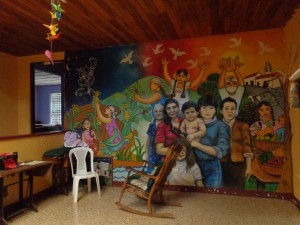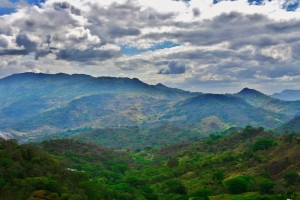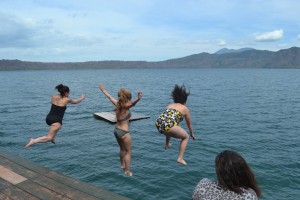We arrived in the city of Managua on May 5th, 2014. I was at first taken aback by the new environment and culture. Here, even though it’s 90 degrees, Nicaraguans still wear pants and long skirts. I’ve even seen some people with jackets on. They must be well adapted to the temperature because I often don’t see them sweat while here I am, struggling to stay dry. I thought I was prepared with clinical strength deodorant. Clearly not.
Another striking difference is the lack of trash cans throughout the city. It is common to see trash on the sides of the streets everywhere and littering has no consequences like there are in the U.S. My OCD has really kicked in here and I keep imagining myself walking around with a garbage bag to clean the city up. Unfortunately this would be a waste of my time. I am happy to say though, I have not littered since being on this trip.
I can’t believe the number of stray dogs there are here in Nicaragua. Me being an animal lover, especially a dog lover, it is very hard to watch these underfed animals stroll the streets. Nicaraguans do not seem to mind at all though. Even our trip to the University of Central America’s (UCA), there were stray dogs roaming the campus. I pointed a dog out to my colleague and made a sad expression. A couple of students on the campus saw my reaction and only looked on in confusion.
We also took a visit to NicaHOPE which is an organization that works in La Chureca, the Managua city dump. The dump use to be a place where families, including children would go to collect recyclables. Some days they would not earn more than a dollar for their work. Children would not be earning an education because there was a need to help support the family. The dump has been closed now for a number of years and the government has built housing around the area for those previously working there. This seems like a great idea, closing the dump and providing housing instead, but now those who use to work there are faced with having to pay bills. For some, working in the dump was the only source of income, so now it is very hard to pay these bills. Families would continue to keep their children out of school so that they could work. NicaHOPE saw this problem and implemented a program where children could come to school and spend part of their day making jewelry to sell and earn money to help with the family. This new income actually exceeded the amount that would be made if a family were working in the dump. I found this compromise to be a genius idea and truly appreciated the resourcefulness of the community.
One of the topics we’ve discussed this week has been women’s rights. Although we may find gender inequalities in the U.S., here in Nicaragua those inequalities are more apparent. Domestic violence is a common trend in this country. It is not just a problem with the rich or poor, but a problem within the culture. The Centro de Mujeres Acahual (Acahuanlinca Women’s Center) (AWC) provides services that address this issue. They have workshops that help build women’s self-esteem as well as counseling services. Aside from working on these subjects, the AWC also provides services that focus on women’s health such as cervical cancer, STI education and family planning. The woman who gave us a lecture AWC was a victim of domestic violence herself. I commend her for taking a negative experience and using it to make a positive impact.
Needless to say, I was slightly depressed my first few days in Nicaragua. The trash everywhere, the stray dogs, children working in dumps and the cultural issues with domestic violence were enough for me. I wanted to fix everything. It was then that a colleague of mine on this trip pointed out that my desire to create what I saw as a better life, was my value and my opinion. If you truly look past what I considered depressing, the people here are actually happy. The kids play outside all day instead of being on an iPad. Family is important and the community is more likely to take care of each other than have individualistic ideals. Stray dogs are everywhere, but at the same time these animals are free to come and go as they please. Since this realization, I’ve been able to put my biases aside and appreciate what this culture has.
-Claire Sutter and Brooke P.













